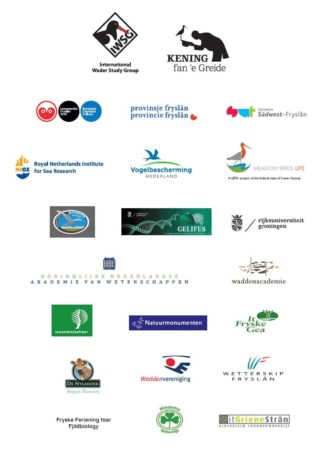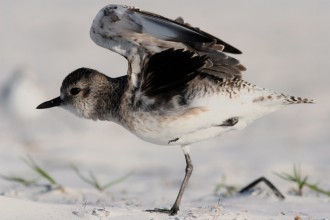Conservation
The International Wader Study Group strongly promotes shorebird conservation, and through its members, conferences and publications, increase knowledge concerning waders and their status. The more members we have, the stronger our voice so join up, and read on.
Migratory Waders in Africa and Western Eurasia in the 1990s was a collaborative exercise to re-evaluate population sizes and trends of all species of migratory waders in Africa and Western Eurasia. It was published as International Wader Studies 15.
Breeding Waders in Europe 2000 was a collaborative exercse to produce new population estimates for all waders breeding in Europe and is now published as International Wader Studies 14
The Cadiz Conclusions draws attention to worldwide declines in shorebird populations…PDF
The Kollumerpomp Statement concerns the conservation status of waders breeding and wintering on lowland farmland in Europe.
New: Product of the workshop "Meadowbird utopias", held Friday 28 September 2018 in Workum, Friesland, The Netherlands
In an attempt to recreate an agricultural countryside full of breeding waders, at least in our minds, this workshop aimed to present and discuss a series of landscape scenarios for Zuidwest-Friesland. The workshop brought together the experts with deep knowledge on particular breeding meadow bird species and their habitats. Within the context of the existing landscape and infrastructure, using variable agricultural management practices to achieve different outcomes, experts were asked to formulate “dream landscapes” where different wader species may once again encounter suitable habitat. By making the utopias species-specific, we hoped to harvest the widest range of ideas and scenarios.
The result is the book “Meadowbirds on the horizon of southwest Friesland”: Harvesting international ecological knowledge to connect farming practices in the southwest of Friesland with biodiversity.

The book is in English and Dutch (“Een horizon vol weidevogels”: Internationale ecologische kennis die de landbouw in Zuidwest-Friesland met biodiversiteit verbindt).
Authors: Ruth A. Howison, Heinrich Belting, Jennifer Smart, Mark Smart, Rob Schuckard, Ole Thorup & Theunis Piersma + International Wader Study Group
Summary: In the low countries of Europe, the downsides of industrial agriculture have been highlighted by the rampant loss of farmland birds, some of the most enigmatic of which are waders. The International Wader Study Group (IWSG) has played its role by first summarizing the ever declining numbers of breeding waders in Europe. In an attempt to be upbeat rather than the usual ‘depressed’, the IWSG international workshop in Workum, Friesland, The Netherlands on 28 September 2018 took an idealistic approach. We put all the work on our disappearing breeding waders to good use in the design of ideal landscapes with various species of meadowbirdson the horizon!
The 71-page booklet can be downloaded from: TeamPiersma.org.
Published with support of:

Report of workshop "Space for Waders", held 12 September 2016 in Trabolgan, Ireland
On 12 September 2016, BirdWatch Ireland and the International Wader Study Group, has brought together professional and amateur specialists from over 20 countries to meet in Ireland to review how sea-level rise threatens migratory shorebirds. The IWSG workshop report titled “Space for Waders: Managing resource needs of coastal waders in the context of rising sea-levels” can be downloaded: Space for Waders – Workshop report IWSG workshop on sea-level rise_12 September 2016.
Main conclusion
In view of the predicted effect of sea-level rise on wader habitats, the workshop has identified a lack in overview of expected large-scale effects of sea-level rise that will have impact on populations of shorebirds.
Call for action
The IWSG therefore calls for detailed interactive documentation showing the predicted changes in sea-levels at key wader sites to become available for each flyway. This will inform and identify key pro-active actions that will benefit critical populations.
Workshop organisers, Olivia Crow& Lesley Lewis, added: “It would be tragic if we do not arm ourselves with the coordinated information to help conserve these spectacular birds which have evolved to make use of such difficult conditions, only to be threatened by the results of human activity.”

